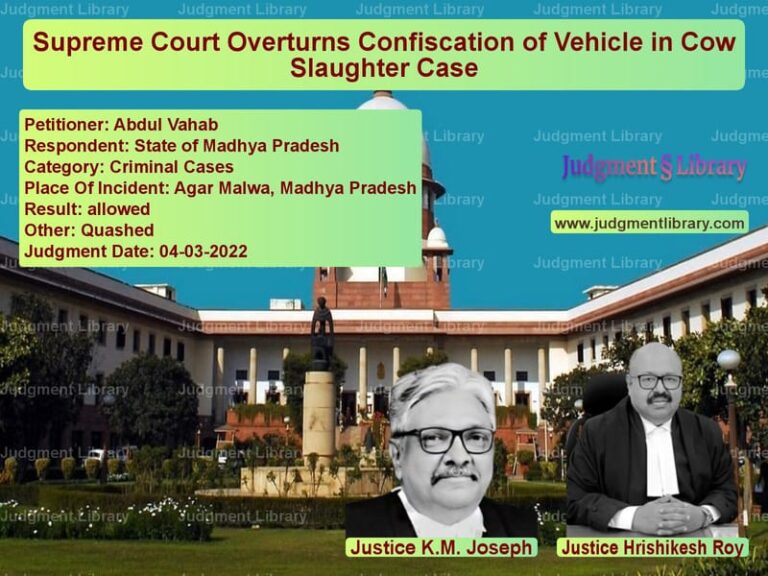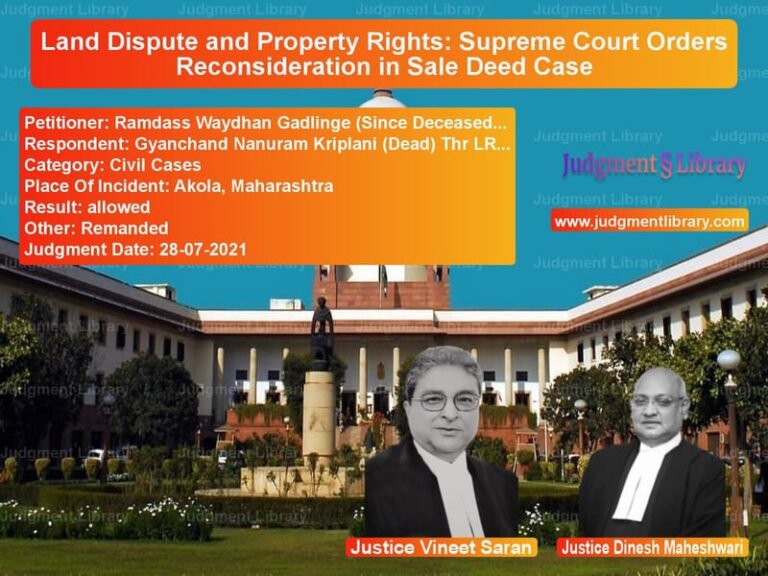Supreme Court Rules on Central Excise Refund: No Need for Fresh Notice Under Section 11A
The Supreme Court of India recently adjudicated on a critical issue concerning the recovery of erroneously refunded excise duty. The case, involving the Commissioner of Central Excise, Mumbai-1, and M/s Morarjee Gokuldas Spinning & Weaving Co. Ltd., revolved around whether a separate notice under Section 11A of the Central Excise Act was required for recovering duty that was erroneously refunded and later reviewed under Section 35E of the Act.
Background of the Case
The respondent, M/s Morarjee Gokuldas Spinning & Weaving Co. Ltd., was engaged in the manufacture of cotton yarn, which it consumed captively within its factory. The dispute originated from the company’s claim that excise duty was not applicable to the captively consumed yarn. This contention was initially upheld by the Delhi High Court in the J.K. Cotton Spinning & Weaving Mills Co. Ltd. vs. Union of India case in 1980, prompting the company to file a revised classification list exempting the yarn from excise duty.
The Revenue rejected the revised classification list, leading to litigation. In 1983, the Supreme Court intervened and allowed the company to furnish a bank guarantee while continuing to pay 50% of the past dues. The case was finally decided by the Supreme Court in 1995, directing the Revenue to issue notices under Section 11A if necessary.
Subsequently, a show cause notice was issued on April 7, 1995, demanding Rs. 2.96 crore in duty. The demand was confirmed by the Assistant Commissioner on March 27, 1996. The company challenged this order before the Commissioner (Appeals) and later the Tribunal. The Tribunal, ruling in favor of the company, held that no recovery could be made without issuing a notice under Section 11A within the prescribed time limit.
The Revenue then invoked Section 35E of the Central Excise Act to review the order sanctioning the refund. The Commissioner (Appeals) ruled against the company, leading to further litigation before the Tribunal and the Bombay High Court, both of which ruled in favor of the company. The Revenue appealed before the Supreme Court.
Arguments by the Appellant (Commissioner of Central Excise, Mumbai-1)
- The High Court erred in relying on its previous judgment in Bajaj Auto Ltd. vs. UOI (2002), instead of the Supreme Court’s ruling in Asian Paints (India) Ltd. vs. CCE (2002).
- The decision in Asian Paints clarified that Sections 35E and 11A operate independently, and recovery of duty can be pursued through Section 35E even if the time limit under Section 11A has expired.
- When an erroneous refund is reviewed and set aside under Section 35E, a separate notice under Section 11A is not required.
- The Tribunal’s decision was flawed as it did not consider unjust enrichment under Section 11B of the Act.
Arguments by the Respondent (M/s Morarjee Gokuldas Spinning & Weaving Co. Ltd.)
- The Tribunal correctly held that a notice under Section 11A is mandatory for any duty recovery.
- The Bombay High Court in Bajaj Auto Ltd. had already ruled that Section 11A is a prerequisite for recovering erroneously refunded amounts.
- The refund was granted lawfully, and any recovery must comply with the procedural requirements of Section 11A.
- Since the Revenue failed to issue a notice under Section 11A within the stipulated time, the recovery attempt was invalid.
Supreme Court’s Observations and Ruling
The Supreme Court ruled in favor of the Revenue, holding that a separate notice under Section 11A is not required when an erroneous refund is reviewed and set aside under Section 35E. The Court made the following key observations:
- The High Court erroneously followed Bajaj Auto Ltd. instead of the Supreme Court’s ruling in Asian Paints (India) Ltd.
- Sections 35E and 11A serve different purposes: Section 35E allows the Revenue to review erroneous orders, whereas Section 11A deals with general duty demands.
- The Tribunal failed to address the unjust enrichment issue, which is a key aspect of refund cases under Section 11B.
- Once a refund order is reviewed and set aside under Section 35E, the Revenue has the authority to recover the amount without issuing a fresh notice under Section 11A.
The Court concluded:
“Once the order sanctioning the refund is set aside under Section 35E, there is no question of issuing a separate notice under Section 11A. The necessary consequence is that the refund order is rendered void, and the Revenue is entitled to recover the amount.”
Final Judgment
The Supreme Court set aside the judgments of the Bombay High Court and the Tribunal. It restored the order passed by the Commissioner (Appeals), which had ruled in favor of the Revenue.
Implications of the Judgment
This ruling has significant implications for excise duty and refund-related disputes:
- Clarity on Refund Recovery: The judgment clarifies that once a refund is reviewed under Section 35E, a separate notice under Section 11A is not required for recovery.
- Precedence of Supreme Court Rulings: The Court reaffirmed that High Courts must follow its precedents instead of relying on conflicting lower court rulings.
- Reinforcement of Section 35E’s Role: The decision strengthens the Revenue’s ability to correct erroneous refund orders without procedural hurdles.
- Emphasis on Unjust Enrichment: The judgment underscores the importance of considering unjust enrichment while deciding refund claims.
Conclusion
The Supreme Court’s ruling in this case reinforces the Revenue’s authority to recover erroneous refunds without procedural redundancies. By affirming that a review under Section 35E is sufficient to nullify an erroneous refund, the Court has provided much-needed clarity on excise law procedures. This decision will serve as a critical reference for future tax litigation and refund disputes.
Petitioner Name: Commissioner of Central Excise, Mumbai – 1.Respondent Name: M/s. Morarjee Gokuldas Spinning & Weaving Co. Ltd..Judgment By: Justice M. R. Shah, Justice Krishna Murari.Place Of Incident: Mumbai.Judgment Date: 23-03-2023.
Don’t miss out on the full details! Download the complete judgment in PDF format below and gain valuable insights instantly!
Download Judgment: commissioner-of-cent-vs-ms.-morarjee-gokuld-supreme-court-of-india-judgment-dated-23-03-2023.pdf
Directly Download Judgment: Directly download this Judgment
See all petitions in Tax Refund Disputes
See all petitions in Customs and Excise
See all petitions in Judgment by Mukeshkumar Rasikbhai Shah
See all petitions in Judgment by Krishna Murari
See all petitions in allowed
See all petitions in Quashed
See all petitions in supreme court of India judgments March 2023
See all petitions in 2023 judgments
See all posts in Taxation and Financial Cases Category
See all allowed petitions in Taxation and Financial Cases Category
See all Dismissed petitions in Taxation and Financial Cases Category
See all partially allowed petitions in Taxation and Financial Cases Category







